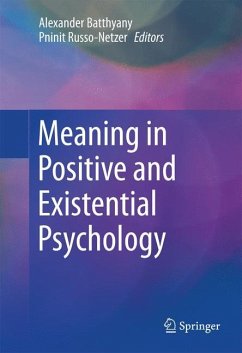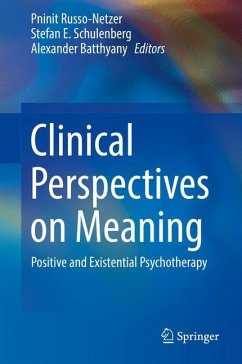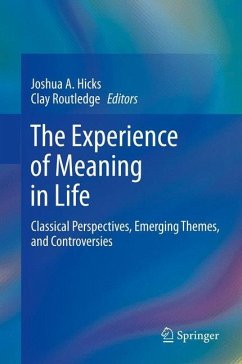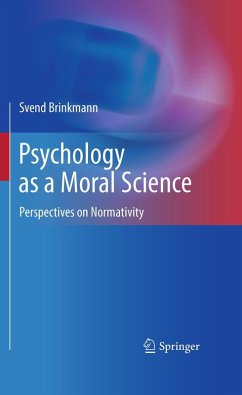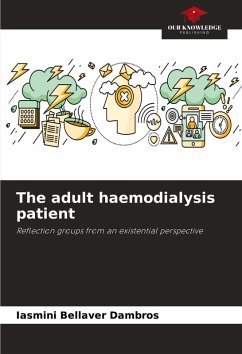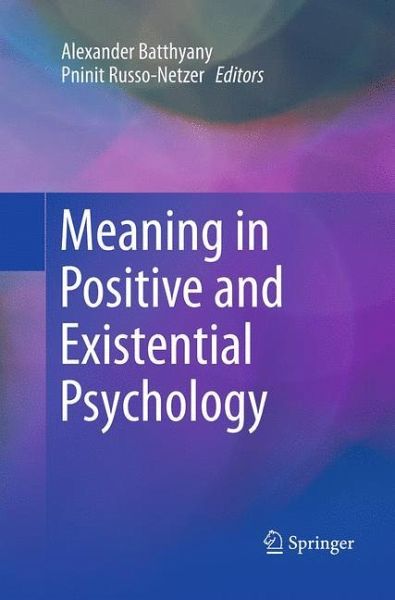
Broschiertes Buch
Meaning in Positive and Existential Psychology
Versandkostenfrei!
Versandfertig in 6-10 Tagen

PAYBACK Punkte
76 °P sammeln!





This book is a first attempt to combine insights from the two perspectives with regard to the question of meaning by examining a collection of theoretical and empirical works. This volume therefore is destined to become an important addition to psychological literature: both from the viewpoint of the history of ideas (again this would be one of the first times that positive and existentialist psychologies meet) and from the viewpoint of theoretical and empirical research into the meaning concept in psychology.
Alexander Batthyany holds the Viktor Frankl Chair for Philosophy and Psychology at the International Academy of Philosophy in the Principality of Liechtenstein. He teaches theory of Cognitive Science at Vienna University's Cognitive Science Program and Logotherapy and Existential Analysis at the Department of Psychiatry at Vienna Medical School. Since 2012, Batthyany is Visiting Professor for Existential Psychotherapy at the Moscow University Institute of Psychoanalysis. He is director of the Viktor Frankl Institute and the Viktor Frankl Archives in Vienna and first editor of the 14-volume Edition of the Collected Works of Viktor Frankl. Batthyany has published several books and articles and lectures widely on philosophical and existential psychology, philosophy of mind, and theory of cognitive science. Pninit Russo-Netzer is a researcher at the Department of Counseling and Human Development at the University of Haifa. Her main research and practice interests focus upon Positive Psychology, meaning in life and Logotherapy, spirituality, change and development. Pninit has published several articles, developed programs and curricula for various organizations on these topics. Pninit lectures on positive psychology and related topics in a number of academic institutions and conducts workshops and training in organizations. She serves as academic advisor and consultant to both academic and non-academic institutions. She is a member of the International Positive Psychology Association and serves on board of directors of the Logotherapy Association in Israel.
Produktdetails
- Verlag: Springer / Springer New York / Springer, Berlin
- Artikelnr. des Verlages: 978-1-4939-5454-4
- Softcover reprint of the original 1st ed. 2014
- Seitenzahl: 488
- Erscheinungstermin: 3. September 2016
- Englisch
- Abmessung: 235mm x 155mm x 27mm
- Gewicht: 746g
- ISBN-13: 9781493954544
- ISBN-10: 1493954547
- Artikelnr.: 45645706
Herstellerkennzeichnung
Springer-Verlag GmbH
Tiergartenstr. 17
69121 Heidelberg
ProductSafety@springernature.com
"The essays in this intriguing and timely volume present a broad overview of contemporary theorizing and empirical work regarding meaning and purpose in life from two distinct intellectual perspectives: positive psychology and existential psychology. ... Taken as a whole, this welcome work offers much that is of tangible benefit to the psychological theorist, researcher, and clinical practitioner, particularly those interested in broadening their conceptual and practical horizons in unexpected directions." (Edwin E. Gantt, Journal of Theoretical and Philosophical Psychology, Vol. 36 (1), 2016)
"In this context, Meaning in Positive and Existential Psychology is valuable not only in content, but also a model for bringing together in
"In this context, Meaning in Positive and Existential Psychology is valuable not only in content, but also a model for bringing together in
Mehr anzeigen
dialogue and collaboration two schools of psychology that have a history of conflict. The contributorsto this volume do not idealistically look to unify existential and positive psychology by oversimplifying or dodging the differences and debates; rather, they take seriously and honor differences in a constructive manner. The primary emphasis of the text is on what these two schools can learn from each other and how they can work together. Some chapters accomplish this better than others, as would be expected in a book with 21 chapters and over 400 pages. Yet, the overall tone of the book is one of collaboration and respect...Meaning in Positive and Existential Psychology will help bridge the divide and promote a more collaborative relationship. If the book does nothing more than accomplish this, it would be an extremely important contribution. However, the book has much more to offer. This volume is an important contribution and important read for anyone interested in existential psychology, positive psychology, and/or the study and application of meaning."
Louis HoffmanPsycCRITIQUES, December 22, 2014, Vol. 59, No. 51, Article 8
Louis HoffmanPsycCRITIQUES, December 22, 2014, Vol. 59, No. 51, Article 8
Schließen
Für dieses Produkt wurde noch keine Bewertung abgegeben. Wir würden uns sehr freuen, wenn du die erste Bewertung schreibst!
Eine Bewertung schreiben
Eine Bewertung schreiben
Andere Kunden interessierten sich für




